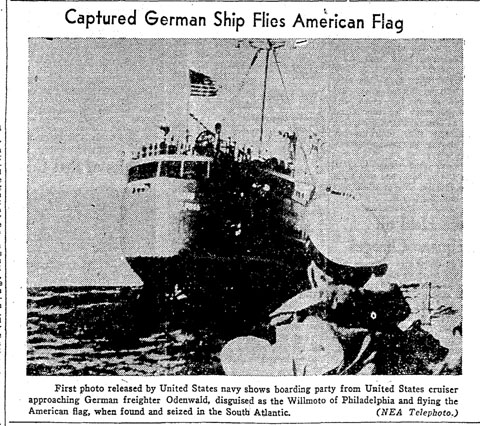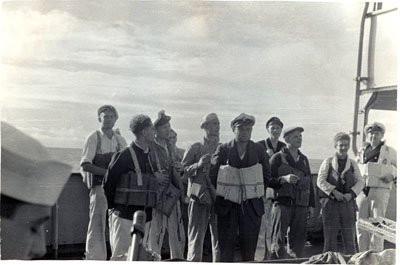
CAPTURED NAZI SHIP TAKEN TO PUERTO RICO
Action Expected Toward Forfeiture of Ship For Disguise
Washington (AP)—The Navy announced today that the disguised axis merchant man captured by a cruiser in the South Atlantic was the German ship, Odenwald, and that it arrived today at San Juan, Puerto Rico.
San Juan, Puerto Rico (AP)—The German motor ship Odenwald, seized in the South Atlantic by units of the U.S. Navy, arrived here this afternoon under American escort.
She was traveling under her own power.
It was understood that prompt action would be brought in U. S. court to forfeit the ship, a 5098-tonner, listed as owned by the Hamburg-American Line, for disguising herself illegally as a U. S. merchantman.
She was enroute to Germany from Japan when she was seized. Much of her cargo was understood to have been rubber, metals and other essential war materials.
Source: Carroll Times-Herald, November 17, 1941
![]()
![]()

Group of Germans that were captured on the Odenwald
![]()
How Hard-Hit is Hitler?
The Nazi motorship Odenwald which was intercepted by an American cruiser and brought into San Juan, Puerto Rico, under the muzzles of U.S. guns may bring a rude awakening to wishful thinkers in this country who think Hitler is being strangled by Britain’s 1918-model blockade.
This Nazi blockade runner, daubed with the American flag on port and starboard hullsides, had a cargo of rubber, metals and other war supplies from Japan. True, it didn’t get through. But the question arises—how many other ships have succeeded in running the blockade? Another question: What were American made tires doing on that ship?
German shipping was called in about the middle of August, 1939. Since then a world girdle of British ships has tried to prevent additional rubber, copper, steel, wheat, oil and a thousand other critical commodities requiring “navicerts” getting into Germany. In the face of this, Germany is able to conduct an all-out war against Russia with no signs of a shortage of war materials.
In every conquered country, particularly France and Belgium and Holland, the Nazis got rich stores of raw materials. The German drive caught Allies unprepared to dynamite huge stores of gasoline, food, metals and raw materials like the scorched-earth policy of Soviet Russia. Probably the Hitler economy has kept going on looted supplies. Probably also it has produced a lot of synthetic rubber and alloy metals. Whatever these probabilities, once point is inescapable: Germany can’t be badly off to run cargoes of contraband all the way through three oceans to Japan.
Anyone who thought Hitler was at the end of his rope economically had better face the facts. From South America, from Africa, from Turkey, from the Vichy colonies, from Spain and Portugal, from its conquests, from somewhere—Germany must be getting raw materials. Hitler’s “new order” isn’t scraping bottom yet.
Source: Mason City Globe-Gazette, November 24, 1941
![]()
Walter Winchell Column
New York Newsman:
The capture of the German ship (Odenwald) in the South Atlantic recently (despite its disguise as an American vessel) happened, we hear, because of a boner. When the warship first encountered it—it was certain the stranger was American but asked for identification anyway.
Promptly came a breezy reply—typically Yankee Doodle in spirit and zing—but it contained one word that trapped it.
The word was Broadway slang and the Germans used it wrongly. That aroused the suspicion of the U. S. warship and the rest is now in the history books.
What was the slang word? Sorry. That’s a naval secret.
Source: West Bend Journal, January 22, 1942
![]()
